
The ruling is likely to put pressure on right-wing Prime Minister Narendra Modi, who swept to power this year pledging clean governance.
The Supreme Court ruled that Modi should be left to choose his own cabinet, but said it hoped the premier would ultimately take into account public expectations and India's democratic values.
"We leave it to the wisdom of the prime minister to see whether people with criminal backgrounds are appointed as ministers," Justice Dipak Misra told the court.
"Ultimately it is expected that people with criminal backgrounds should not be part of the council of ministers," said Misra, who headed a bench of five judges.
"Ultimately it is expected that the prime minister should consider and not choose a person with a criminal background and that is the constitution's expectation."
The court was handing down its judgement on a petition seeking to bar MPs with "criminal backgrounds", including those charged but not yet convicted of crimes, from being appointed ministers in state and federal governments.
The court said it could not disqualify such MPs from cabinet. India bans those convicted of serious crimes from holding office, not those facing charges.
Modi won a landslide election in May partly on a promise to clean up government after the previous Congress-led administration was plagued by corruption and other scandals.
Thirteen of Modi's 45 ministers have been charged with criminal offences, eight of those involving serious charges, according to the Delhi-based Association of Democratic Reforms, a clean government advocacy group.
Water Resources and Ganga Rejuvenation Minister Uma Bharti has 13 cases pending, including two charges related to attempted murder and six charges related to rioting, the association said.
MPs say charges against them are false or trumped up or levelled by political opponents seeking to harm their reputations.
MPs convicted of crimes have traditionally continued to hold office simply by filing an appeal in India's clogged and notoriously slow courts.
But in a landmark judgement last July, the Supreme Court ruled that MPs sentenced to more than three years in jail should be disqualified, regardless of any appeal.
COMMENTS (5)
Comments are moderated and generally will be posted if they are on-topic and not abusive.
For more information, please see our Comments FAQ
1736585048-0/Untitled-design-(1)1736585048-0-405x300.webp)
1736582706-0/fizza-(2)1736582706-0-165x106.webp)
1736579961-0/fizza-(1)1736579961-0-165x106.webp)







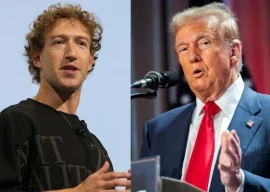
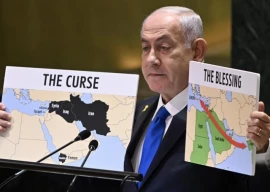
1736508423-0/Express-Tribune---News-Desk-(9)1736508423-0-270x192.webp)

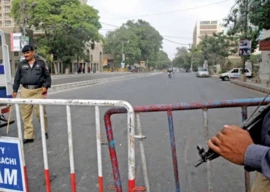
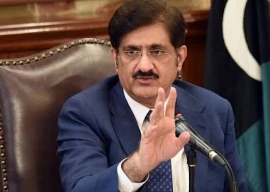
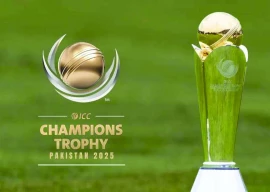






@gp65: You say: (Supreme court’s direction appears to be that anyone accused of heinous crime must be presumed guilty until they are judged not guilty by the court. That is the exact opposite of how courts function all over the world.)
How did you come to this fantastic conclusion? If SC had practiced "opposite" of rest of the world Modi would have been in irons long back. SC refused to entertain the petition in current matter and left it only to the good sense of the PM of the day to appoint right ministers as per his wisdom. It's for PM to decide whether pendency of conviction constitutes not only absence of guilt, but also whether it causes negative image projection. That doesn't make PM a Super-Judge, just a person of wisdom. Should PM deny ministerial job to a woman who was undeniably aggressively involved in breaking of a place of worship but not so convicted yet? It's for him too to determine whether an improper conduct that is not a Case, not an offense in IPC, is still serious enough to warrant a second look. He is The Best, for you guys, better than rest isn't he, so accept nothing but the Best! If a Minister has misdeclared her educational qualifications more than once it may be an impropriety for EC but not a cognizable offense under IPC. Depending on his views on probity in public life should PM tolerate such a person in one of most sensitive ministry? May be yes, may be not. That becomes a matter of PM's wisdom. But then SC erred in expecting such wisdom from a man who himself is a beneficiary of lax morals & lazy system.
@Bewildered: More than any other PM Modi is under magnifying glass. That's because of a spate of rash promises he had made during campaigning. For example, on 5th May 2014, at Allahabad Narendra Modi swore that as soon as he is made the PM he will have affidavits submitted by all successful candidates to the Supreme Court so that SC can pronounce verdict within a year on all pending criminal cases against them. If they are disqualified he would gladly go for by-elections by the dozen. He included himself, "Agar Modi ke oopar bhi koi mukddama ho to woh bhi Supreme Court mein chalega, (if there is a case against Modi, it will also be tried in Supreme Court)." No such "fast track" approach to SC has been made at least with regard to those that are now his ministers. Apart from misleading his listeners about how criminal justice system works in India, he obviously didn't mean what he said.
@Bewildered: If a spontaneous riot broke out after pilgrims train was set on fire and burnt in your state will you blame your CM for it?. There's a difference between being tardy CM of not handling the crisis better and actually rioting on streets. He wasn't rioting on streets. Supreme Court found no evidence no matter how much opposition put frivolous charges to stunt his political growth from Gujarat to national level, a threat to opposition who tried to nip him in bud. 2. In india a person is innocent unless proven guilty. Due to slow paced judicial process. It hampers the genuine people charged by the system and malicious people. Therefore no restriction on them holding public office or other work. Until it's proven they are convicts.
ET mods - 2nd attempt. Everything is factual and pertains directly to the newsitem
There is a difference between accused and convicted. Those convicted are barred by law from being member of parliament. SC judgment last year plugged a loophole where people convicted in lower court would appeal and on basis of that appeal continue to remain MPs. Now even if the lowest court convicts you, you cannot be an MP, so the question of becoming minister does not even arise.
The issue here refers to those accused of crime but not convicted. Supreme court's direction appears to be that anyone accused of heinous crime must be presumed guilty until they are judged not guilty by the court. That is the exact opposite of how courts function all over the world.
It further sets up a precedence to encourage malafide registration of FIRs against political opponents. The law requires that anyone seeking to register FIR should be allowed to do so. If the case is very weak and person is never indicted, they will obviously never get their day in court and be judged not guilty. According to the Judge, such a person then will be forever be barred from becoming a minister because they have been accused of a crime and never pronounced not guilty.
No political system would be able to function like this.
Modi had recommended that all parliamentarians who have been accused of heinous crime should be judged through a fast track court. Thus guilty can be weeded out and innocent can serve without blemish. The court did not accept it saying that fast tracking some cases would lead to slowing down others - which is a fair point. However, in the direction to condmn a man unheard seems very strange indeed.